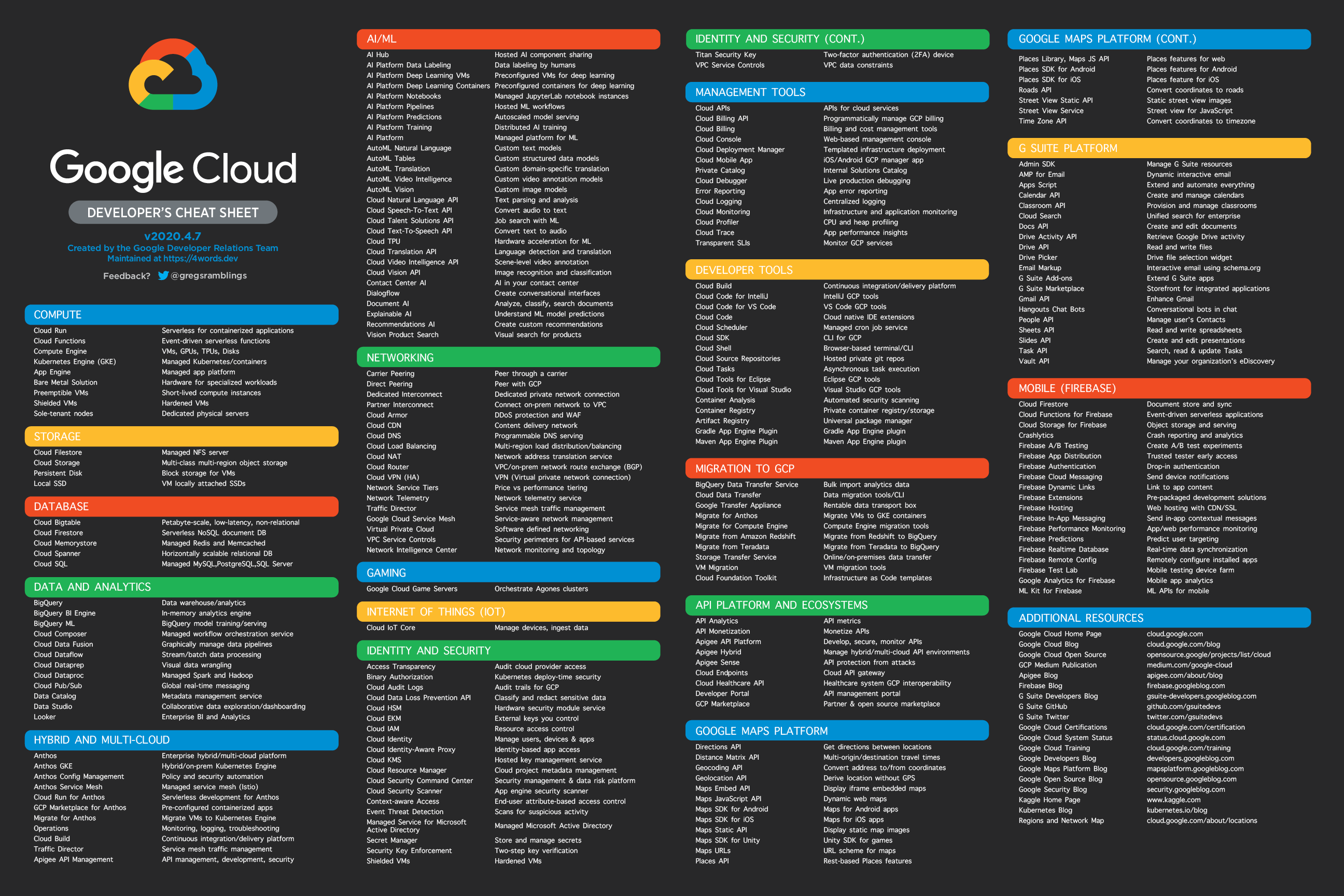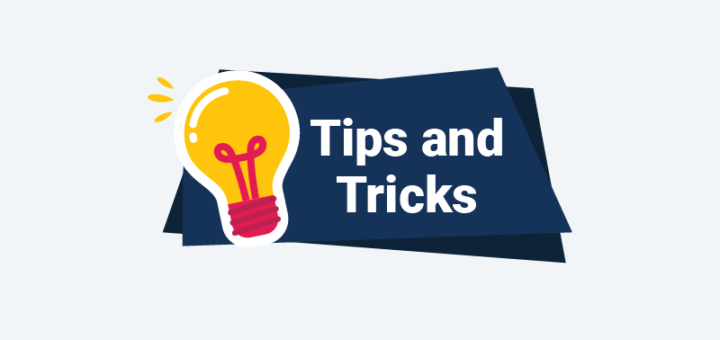Google Cloud Developer’s Cheat Sheet
All Products
Compute
- Cloud Run: Serverless for containerized applications 🔗 📄
- Cloud Functions: Event-driven serverless functions 🔗 📄
- Compute Engine: VMs, GPUs, TPUs, Disks 🔗 📄
- Kubernetes Engine (GKE): Managed Kubernetes/containers 🔗 📄
- App Engine: Managed app platform 🔗 📄
- Bare Metal Solution: Hardware for specialized workloads 🔗
- Preemptible VMs: Short-lived compute instances 🔗 📄
- Shielded VMs: Hardened VMs 🔗 📄
- Sole-tenant nodes: Dedicated physical servers 🔗 📄
Storage
- Cloud Filestore: Managed NFS server 🔗 📄
- Cloud Storage: Multi-class multi-region object storage🔗 📄
- Persistent Disk: Block storage for VMs 🔗 📄
- Local SSD: VM locally attached SSDs 🔗 📄
Database
- Cloud Bigtable: Petabyte-scale, low-latency, non-relational 🔗 📄
- Cloud Firestore: Serverless NoSQL document DB 🔗 📄
- Cloud Memorystore: Managed Redis and Memcached 🔗 📄
- Cloud Spanner: Horizontally scalable relational DB 🔗 📄
- Cloud SQL: Managed MySQL, PostgreSQL, SQL Server 🔗 📄
Data and Analytics
- BigQuery: Data warehouse/analytics 🔗 📄
- BigQuery BI Engine: In-memory analytics engine 📄
- BigQuery ML: BigQuery model training/serving 📄
- Cloud Composer: Managed workflow orchestration service 🔗 📄
- Cloud Data Fusion: Graphically manage data pipelines 🔗 📄
- Cloud Dataflow: Stream/batch data processing 🔗 📄
- Cloud Dataprep: Visual data wrangling 🔗 📄
- Cloud Dataproc: Managed Spark and Hadoop 🔗 📄
- Cloud Pub/Sub: Global real-time messaging 🔗 📄
- Data Catalog: Metadata management service 🔗 📄
- Data Studio: Collaborative data exploration/dashboarding 🔗 📄
- Looker: Enterprise BI and Analytics 🔗
Hybrid and Multi-cloud
- Anthos: Enterprise hybrid/multi-cloud platform 🔗 📄
- Anthos GKE: Hybrid/on-prem Kubernetes Engine 🔗 📄
- Anthos Config Management:Policy and security automation 🔗 📄
- Anthos Service Mesh: Managed service mesh (Istio) 🔗 📄
- Cloud Run for Anthos: Serverless development for Anthos 🔗 📄
- Google Cloud Marketplace for Anthos: Pre-configured containerized apps 🔗 📄
- Migrate for Anthos: Migrate VMs to Kubernetes Engine 🔗 📄
- Operations: Monitoring, logging, troubleshooting 🔗 📄
- Cloud Build: Continuous integration/delivery platform 🔗 📄
- Traffic Director: Service mesh traffic management 🔗 📄
- Apigee API Management: API management, development, security 🔗
AI/ML
- AI Hub: Hosted AI component sharing 🔗 📄
- AI Platform Data Labeling: Data labeling by humans 📄
- AI Platform Deep Learning VMs: Preconfigured VMs for deep learning 🔗 📄
- AI Platform Deep Learning Containers: Preconfigured containers for deep learning 🔗 📄
- AI Platform Notebooks: Managed JupyterLab notebook instances 🔗📄
- AI Platform Pipelines: Hosted ML workflows🔗
- AI Platform Predictions: Autoscaled model serving 📄
- AI Platform Training: Distributed AI training 📄
- AI Platform: Managed platform for ML 🔗
- AutoML Natural Language: Custom text models 📄
- AutoML Tables: Custom structured data models 🔗 📄
- AutoML Translation: Custom domain-specific translation 🔗 📄
- AutoML Video Intelligence: Custom video annotation models 🔗 📄
- AutoML Vision: Custom image models 🔗 📄
- Cloud Natural Language API: Text parsing and analysis 🔗 📄
- Cloud Speech-To-Text API: Convert audio to text 🔗 📄
- Cloud Talent Solutions API: Job search with ML 🔗 📄
- Cloud Text-To-Speech API: Convert text to audio 🔗 📄
- Cloud TPU: Hardware acceleration for ML 🔗 📄
- Cloud Translation API: Language detection and translation 🔗 📄
- Cloud Video Intelligence API: Scene-level video annotation 🔗 📄
- Cloud Vision API: Image recognition and classification 🔗 📄
- Contact Center AI: AI in your contact center🔗 📄
- Dialogflow: Create conversational interfaces 🔗 📄
- Document AI: Analyze, classify, search documents 🔗 📄
- Explainable AI: Understand ML model predictions 🔗 📄
- Recommendations AI: Create custom recommendations 🔗 📄
- Vision Product Search: Visual search for products 📄
Networking
- Carrier Peering: Peer through a carrier 📄
- Direct Peering: Peer with GCP 📄
- Dedicated Interconnect: Dedicated private network connection 📄
- Partner Interconnect: Connect on-prem network to VPC 📄
- Cloud Armor: DDoS protection and WAF 🔗 📄
- Cloud CDN: Content delivery network 🔗 📄
- Cloud DNS: Programmable DNS serving 🔗 📄
- Cloud Load Balancing: Multi-region load distribution/balancing 🔗 📄
- Cloud NAT: Network address translation service 📄
- Cloud Router: VPC/on-prem network route exchange (BGP) 📄
- Cloud VPN (HA): VPN (Virtual private network connection) 📄
- Network Service Tiers: Price vs performance tiering 🔗 📄
- Network Telemetry: Network telemetry service 🔗 📄
- Traffic Director: Service mesh traffic management 🔗 📄
- Google Cloud Service Mesh: Service-aware network management 🔗 📄
- Virtual Private Cloud: Software defined networking 🔗 📄
- VPC Service Controls: Security perimeters for API-based services 🔗 📄
- Network Intelligence Center: Network monitoring and topology 🔗 📄
Internet of Things (IoT)
Gaming
- Google Cloud Game Servers: Orchestrate Agones clusters 🔗
Identity and Security
- Access Transparency: Audit cloud provider access 🔗 📄
- Binary Authorization: Kubernetes deploy-time security 🔗 📄
- Cloud Audit Logs: Audit trails for GCP 🔗 📄
- Cloud Data Loss Prevention API: Classify and redact sensitive data 🔗 📄
- Cloud HSM: Hardware security module service 🔗 📄
- Cloud EKM: External keys you control 🔗 📄
- Cloud IAM: Resource access control 🔗 📄
- Cloud Identity: Manage users, devices & apps 🔗 📄
- Cloud Identity-Aware Proxy: Identity-based app access 🔗 📄
- Cloud KMS: Hosted key management service 🔗 📄
- Cloud Resource Manager: Cloud project metadata management 🔗 📄
- Cloud Security Command Center: Security management and data risk platform 🔗 📄
- Cloud Security Scanner: App engine security scanner 🔗 📄
- Context-aware Access: End-user attribute-based access control 🔗 📄
- Event Threat Detection: Scans for suspicious activity 🔗
- Managed Service for Microsoft Active Directory: Managed Microsoft Active Directory 🔗 📄
- Secret Manager: Store and manage secrets 🔗 📄
- Security Key Enforcement: Two-step key verification 🔗
- Shielded VMs: Hardened VMs 🔗 📄
- Titan Security Key: Two-factor authentication (2FA) device 🔗
- VPC Service Controls: VPC data constraints 🔗 📄
Management Tools
- Cloud APIs: APIs for cloud services 🔗 📄
- Cloud Billing API: Programmatically manage GCP billing 📄
- Cloud Billing: Billing and cost management tools 🔗 📄
- Cloud Console: Web-based management console 🔗
- Cloud Deployment Manager: Templated infrastructure deployment 🔗 📄
- Cloud Mobile App: iOS/Android GCP manager app 🔗
- Private Catalog: Internal Solutions Catalog 🔗 📄
- Cloud Debugger: Live production debugging 🔗 📄
- Error Reporting: App error reporting 🔗 📄
- Cloud Logging: Centralized logging 🔗 📄
- Cloud Monitoring: Infrastructure and application monitoring 🔗 📄
- Cloud Profiler: CPU and heap profiling 🔗 📄
- Cloud Trace: App performance insights 🔗 📄
- Transparent SLIs: Monitor GCP services 🔗 📄
Developer Tools
- Cloud Build: Continuous integration/delivery platform 🔗 📄
- Cloud Code for IntelliJ: IntelliJ GCP tools 🔗
- Cloud Code for VS Code: VS Code GCP tools 🔗
- Cloud Code: Cloud native IDE extensions 🔗 📄
- Cloud Scheduler: Managed cron job service 🔗 📄
- Cloud SDK: CLI for GCP 🔗 📄
- Cloud Shell: Browser-based terminal/CLI 🔗 📄
- Cloud Source Repositories: Hosted private git repos 🔗 📄
- Cloud Tasks: Asynchronous task execution 🔗 📄
- Cloud Tools for Eclipse: Eclipse GCP tools 🔗
- Cloud Tools for Visual Studio: Visual Studio GCP tools 🔗
- Container Analysis: Automated security scanning 🔗 📄
- Container Registry: Private container registry/storage 🔗 📄
- Artifact Registry: Universal package manager 🔗 📄
- Gradle App Engine Plugin: Gradle App Engine plugin 🔗
- Maven App Engine Plugin: Maven App Engine plugin 🔗
Migration to GCP
- BigQuery Data Transfer Service: Bulk import analytics data 🔗 📄
- Cloud Data Transfer: Data migration tools/CLI 🔗
- Google Transfer Appliance: Rentable data transport box 🔗 📄
- Migrate for Anthos: Migrate VMs to GKE containers 🔗 📄
- Migrate for Compute Engine: Compute Engine migration tools 🔗 📄
- Migrate from Amazon Redshift: Migrate from Redshift to BigQuery 🔗
- Migrate from Teradata: Migrate from Teradata to BigQuery 🔗
- Storage Transfer Service: Online/on-premises data transfer 📄
- VM Migration: VM migration tools 🔗
- Cloud Foundation Toolkit: Infrastructure as Code templates 🔗
API Platform and Ecosystems
- API Analytics: API metrics 🔗
- API Monetization: Monetize APIs 🔗
- Apigee API Platform: Develop, secure, monitor APIs 🔗
- Apigee Hybrid: Manage hybrid/multi-cloud API environments 🔗📄
- Apigee Sense: API protection from attacks 🔗
- Cloud Endpoints: Cloud API gateway 🔗
- Cloud Healthcare API: Healthcare system GCP interoperability 🔗
- Developer Portal: API management portal 🔗
- GCP Marketplace: Partner & open source marketplace 🔗
Google Maps Platform
- Directions API: Get directions between locations 🔗
- Distance Matrix API: Multi-origin/destination travel times 🔗
- Geocoding API: Convert address to/from coordinates 🔗
- Geolocation API: Derive location without GPS 🔗
- Maps Embed API: Display iframe embedded maps 🔗
- Maps JavaScript API: Dynamic web maps 🔗
- Maps SDK for Android: Maps for Android apps 🔗
- Maps SDK for iOS: Maps for iOS apps 🔗
- Maps Static API: Display static map images 🔗
- Maps SDK for Unity: Unity SDK for games 🔗
- Maps URLs: URL scheme for maps 🔗
- Places API: Rest-based Places features 🔗
- Places Library, Maps JS API: Places features for web 🔗
- Places SDK for Android: Places features for Android 🔗
- Places SDK for iOS: Places feature for iOS 🔗
- Roads API: Convert coordinates to roads 🔗
- Street View Static API: Static street view images 🔗
- Street View Service: Street view for JavaScript 🔗
- Time Zone API: Convert coordinates to timezone 🔗
G Suite Platform
- Admin SDK: Manage G Suite resources 🔗
- AMP for Email: Dynamic interactive email 🔗
- Apps Script: Extend and automate everything 🔗
- Calendar API: Create and manage calendars 🔗
- Classroom API: Provision and manage classrooms 🔗
- Cloud Search: Unified search for enterprise 🔗
- Docs API: Create and edit documents 🔗
- Drive Activity API: Retrieve Google Drive activity 🔗
- Drive API: Read and write files 🔗
- Drive Picker: Drive file selection widget 🔗
- Email Markup: Interactive email using schema.org 🔗
- G Suite Add-ons: Extend G Suite apps 🔗
- G Suite Marketplace: Storefront for integrated applications 🔗
- Gmail API: Enhance Gmail 🔗
- Hangouts Chat Bots: Conversational bots in chat 🔗
- People API: Manage user’s Contacts 🔗
- Sheets API: Read and write spreadsheets 🔗
- Slides API: Create and edit presentations 🔗
- Task API: Search, read & update Tasks 🔗
- Vault API: Manage your organization’s eDiscovery 🔗
Mobile (Firebase)
- Cloud Firestore: Document store and sync 🔗
- Cloud Functions for Firebase: Event-driven serverless applications 🔗
- Cloud Storage for Firebase: Object storage and serving 🔗
- Crashlytics: Crash reporting and analytics 🔗
- Firebase A/B Testing: Create A/B test experiments 🔗
- Firebase App Distribution: Trusted tester early access 🔗
- Firebase Authentication: Drop-in authentication 🔗
- Firebase Cloud Messaging: Send device notifications 🔗
- Firebase Dynamic Links: Link to app content 🔗
- Firebase Extensions: Pre-packaged development solutions 🔗
- Firebase Hosting: Web hosting with CDN/SSL 🔗
- Firebase In-App Messaging: Send in-app contextual messages 🔗
- Firebase Performance Monitoring: App/web performance monitoring 🔗
- Firebase Predictions: Predict user targeting 🔗
- Firebase Realtime Database: Real-time data synchronization 🔗
- Firebase Remote Config: Remotely configure installed apps 🔗
- Firebase Test Lab: Mobile testing device farm 🔗
- Google Analytics for Firebase: Mobile app analytics 🔗
- ML Kit for Firebase: ML APIs for mobile 🔗
Additional Resources
- Google Cloud Home Page: 🔗
- Google Cloud Blog: 🔗
- Google Cloud Open Source: 🔗
- GCP Medium Publication: 🔗
- Apigee Blog: 🔗
- Firebase Blog: 🔗
- G Suite Developers Blog: 🔗
- G Suite GitHub: 🔗
- G Suite Twitter: 🔗
- Google Cloud Certifications: 🔗
- Google Cloud System Status: 🔗
- Google Cloud Training: 🔗
- Google Developers Blog: 🔗
- Google Maps Platform Blog: 🔗
- Google Open Source Blog: 🔗
- Google Security Blog: 🔗
- Kaggle Home Page: 🔗
- Kubernetes Blog: 🔗
- Regions and Network Map: 🔗
Additional Resources
- Source for this document: 🔗
- Google Cloud Solutions Library: 🔗
- G Suite Solutions Gallery: 🔗
- Google Cloud Support Hub: 🔗
- GCP Pricing: 🔗
- GCP Pricing Calculator: 🔗
- Qwiklabs Home Page: 🔗
- Codelabs Home Page: 🔗
- YouTube Channels:
- Podcasts:
- Reddit:
- Big Data / Data Analytics Product Comparisons: 🔗
- Compute Product Comparisons: 🔗
- Database Product Comparisons: 🔗
- Networking Product Comparisons: 🔗
- Storage Product Comparisons: 🔗
GCP Foundational Open Source Projects
- Apache Beam: Batch/streaming data processing 🔗
- Go: High Concurrency Programming Language 🔗
- gRPC: RPC framework 🔗
- gVisor: Secure container runtime 🔗
- Istio: Connect and secure services 🔗
- Knative: Serverless framework for Kubernetes 🔗
- Kubeflow: ML toolkit for Kubernetes 🔗
- Kubernetes: Management of containerized applications 🔗
- OpenCensus: Cloud native observability framework 🔗
- TensorFlow: ML framework 🔗
Platform Comparisons
- Google Cloud Platform for AWS Professionals: 📄
- Google Cloud Platform for Azure Professionals: 📄
- Google Cloud Platform for Data Center Professionals: 📄
- Google Cloud Platform for OpenStack Users: 📄




